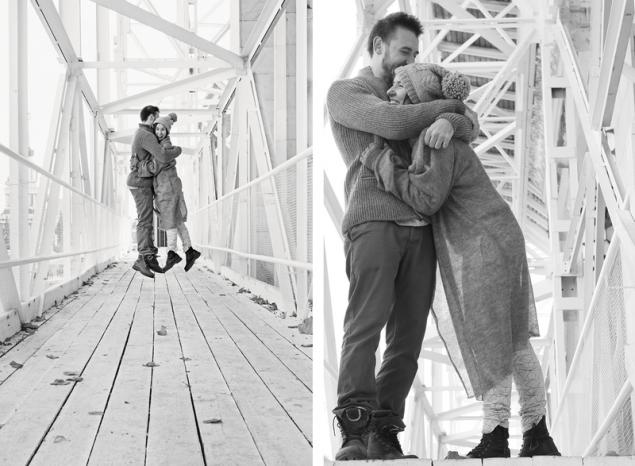466
Hold me
I grew up in my parents ' pub in England, which has always been some kind of tragedy. And all these tragedies — fights, flirting, tears, tantrums — was arranged out of love. And I saw my parents love destroy each other. Since then, I have decided that I will have to figure out what love is. My mother used to say that love is a "funny five minutes". Others have defined love as a mysterious blend of feelings and sex. Or as a combination of passion and friendship. But love is something more.

My personal conclusions based on research and consultations with over a thousand couples over 35 years, turned into a huge science book, and now I can confidently say we know what love is. My conclusions are intuitive and not always clear: love is the constant search for the underlying secure communication with someone else. Through this relationship, the partners in love become emotionally dependent on each other in terms of mutual care, support and protection.
We're connected in a literal sense "built into us" the need for emotional contact and responsiveness from significant to us. This is the survival instinct, the vital need for security, satisfaction which the child seeks the mother. This observation is the basis of attachment theory. Plenty of evidence suggests that the need for secure attachment never disappears, and develops in adults in the need of a robust emotional connection with a partner. Remember: the mother looks at her child with the same love that two lovers on each other.
Although in our culture it is believed that addiction is bad, that is a weakness, it is not. When we become attached to someone, we experience the greatest sense of security and safety. Dependence on partners means that you are important to him, what you value, and that it will be sensitive and attentive to your emotional needs.
According to the basic postulate of attachment theory, isolation is not only physical but also emotional, is traumatic. The brain reacts to it as a danger. Gloria Steinem once said a woman needs man like fish Bicycle. Absolute nonsense.
Love drama that played out in front of me in the pub every night, when I was a child, showed nothing like a human hunger for reliable emotional connection is a necessary condition of our survival, from the cradle to the grave. Once he felt safe emotional connection with our partner, we will be more patient to endure the wounds, which inevitably will cause us to daily life with him.
The rupture of relations
First, we are extremely attached and sympathetic towards our partners. But our degree of involvement typically decreases with time. Then we experience the moments of separation — times when we don't Express our needs clearly enough. He's upset and needs cheering up and support, but she leaves him, thinking that he wants to be alone. In fact, in relations such moments are inevitable. If you are going with someone to dance, then from time to time you will step on each other feet.
But the loss of connection with a loved one jeopardizes our sense of security. We experience a primal feeling of panic. In the amygdala of our brain responsible for fear, receive an alarm signal. And then we no longer think — we act. Anxiety can come from both external and our internal world. It is in our minds, not in reality.If we feel abandoned at the time of acute needs, we begin to panic.
What are we to do after these moments of separation that have a huge impact on our relationship? You can turn around and re-establish contact? If not, you will begin to participate in the battle for a clear pattern. I call them "demon dialogues". If they start to gain momentum, it will grab you and cause a terrible sense of emotional aloneness. Your relationship will less and less be perceived as a safety zone and begin to unravel. You begin to doubt that your partner is the person that you need that he appreciates you. Or that you have it in the first place.
Consider a couple with a firstborn. Childbirth is a stressful, sleepless time. But it is also a time when the fear of loss of affection and the need for proximity is especially strong. A man can think something like this: "I know it's wrong, I know it sounds pathetic, but I have a feeling the baby I lost my wife." A woman can say: "I had a baby and I feel so vulnerable. I care about this little creature, I just needed extra rest and care, and he, as luck would have it, all the time at work." They have good intentions — it takes care of the child, he works hard to provide for his family, but they can't give each other what they really need.
Or such example: a man good at his job, while his wife makes a fantastic career in a new field. She spends a lot of time on various interesting projects while he is deprived of love, attention and intimacy. Every night he lay alone in bed and waiting for her, and, of course, feels himself a fool, due to the fact that so needs it — and angry that she doesn't realize how much her absence affects him.
But, as a rule, we do not discuss such conflicts in these terms, drawing on deeply rooted in us the need for proximity and attachment. We talk about the surface emotions, irritation or indifference, and blame each other. "He's so angry all the time breaks down on me." Or: "She's so cold. I think she even care!". Each retreats into a corner, both in the pair are getting harder and harder to Express our deepest need for intimacy, and they are deprived of opportunities to receive consolation from each other.
Women are usually more sensitive to the first signs of loss of communication than men, and their response is often the initiation of what I call a dance break. They will almost defiantly to pursue their partners in a vain attempt to get a satisfying and soothing their response. But how they do it, practically nullifies the possibility of a positive result — because they blame their partner.
Men are also taught to suppress emotional responses and needs, which could help them emerge from conflict. And her fury, and his indifference is only a mask under which hides the vulnerability and need for connection, now mixed with sadness, shame, and — most of all — fear.
Couples rarely notice that most of the "fights" between them are really a protest against emotional separation. All these quarrels partners desperately want to know is "are You mine? You need me? Do you trust me?".
The restoration of relations
For many years physicians have considered these "demon dialogues" as the struggle for power. They tried to resolve conflicts by teaching couples the skills to solve problems. But it's still a lot to offer a handkerchief with viral pneumonia. Thereby ignored the issues of attachment that underlie the problem behaviour. The problem, from this perspective, is not the struggle for power and control and emotional distance.
What is particularly frustrare people is not knowing how to overcome this emotional separation. In my office men sometimes say to me: "I do everything to show their concern. I mow the lawn, bring a salary, solve problems, and don't flirt on the side. Why it does not matter, and all that is necessary to my wife — talk about emotional stuff and cuddle?". I tell them: "Because we are so arranged. We need someone who will be really attentive to us, who will hug us. You forgot that you also need?".
When we fight with our partners, we tend to see that side of the ball, paying attention to the last barb in our address, instead of to think, do we need to do to be in the game. To break out of the "demon dialogues" maybe, but the first step is to exit the game, not just a sequel for the game. Once you realize that fixated on the fight, you will be able to agree to put the whole game on pause.
Disappointment is an inevitable part of a relationship. But you can always choose your attitude towards them and their behaviour. If you take a defensive position out of fear, or solve all in the spirit of understanding? Let's say your wife says, "I'm not really determined to make love tonight." You can take a deep breath, to remember how much she loves you, and say, "Gee, it's sad, I really wanted to do." Or you can spit out a sarcastic, "Great! We never have sex, right?".
Of course, you may feel that you do not have a choice if your panic button is pressed, and your emotions are already bubbling. But even a simple understanding of this is "my panic button is pressed" — can reassure you. You can think to yourself "What's going on? I scream. But inside I feel small and helpless." Then you can tell your partner: "I was hurt, and I started to panic".
If you make this courageous step and respond with the intention of restoring relationships, you can expect that your partner will do the same, instead of saying something hurtful like, "You're being ridiculous and disgusting". This is part of a relationship, which requires of mastery: to change the dance, both partners need to do other steps.
Just accept your need for proximity instead of ashamed of it is an important and necessary first step, and this applies to both people who are a couple, and alone. A single person can say "I'm depressed because I'm lonely, but I know I don't have to be alone, I have to be self-sufficient and independent." Well, of course you're depressed, if you feel lonely, and you still blamed yourself for it! When you are ashamed, you tend to hide it from the others, creating a vicious circle, and it is almost guaranteed that you will gain the respect you need.
Healing touch
Men often say to me: "Even if I think she really needs me or she's scared, I don't know what to do!". In the end, he will make his wife a Cup of tea, which, of course, very nice, but not what she needed. He put a hand on her shoulder or draw to you, his attempt to make contact would have been much more successful.
Men often say they don't know what to do. But they know how to soothe their children when they lay down to sleep and whisper them soft. The difference is that they see the vulnerability of their children and react to it, but when they look at their wives, they see only the one who condemns them. But she also feels vulnerable.
Touch — the easiest way to get in touch with the other person. Taking her hand when she's nervous, or tapping him on the shoulder in the middle of a fight, you can instantly negate anxiety and anger.
The world of psychotherapy in recent years obsessed with the subject maintaining boundaries between people. I think our problem is the opposite — we are all too far from each other.
Also interesting: the Unhappy marriage — deadly!
Unlived unlived emotions attract events to life
If you look at two lovers, you will see that they constantly touch each other. If you look at two people who find a way back into love relationship after falling in "dialogues of the demon", you'll see that they also embrace more often than usual. They are literally drawn to each other — it is a tangible sign of their desire to be together.published
Sue Johnson, a clinical psychologist and author of the book "Hold me tight. Seven conversations for a lifetime of love" (Hold me up. Seven conversations for a lasting love").
Translation Of Maria Stroganova
P. S. And remember, only by changing their consumption — together we change the world! ©
Source: splash.project-splash.com/posts/obnimi-menya/h3ccfb3487e

My personal conclusions based on research and consultations with over a thousand couples over 35 years, turned into a huge science book, and now I can confidently say we know what love is. My conclusions are intuitive and not always clear: love is the constant search for the underlying secure communication with someone else. Through this relationship, the partners in love become emotionally dependent on each other in terms of mutual care, support and protection.
We're connected in a literal sense "built into us" the need for emotional contact and responsiveness from significant to us. This is the survival instinct, the vital need for security, satisfaction which the child seeks the mother. This observation is the basis of attachment theory. Plenty of evidence suggests that the need for secure attachment never disappears, and develops in adults in the need of a robust emotional connection with a partner. Remember: the mother looks at her child with the same love that two lovers on each other.
Although in our culture it is believed that addiction is bad, that is a weakness, it is not. When we become attached to someone, we experience the greatest sense of security and safety. Dependence on partners means that you are important to him, what you value, and that it will be sensitive and attentive to your emotional needs.
According to the basic postulate of attachment theory, isolation is not only physical but also emotional, is traumatic. The brain reacts to it as a danger. Gloria Steinem once said a woman needs man like fish Bicycle. Absolute nonsense.
Love drama that played out in front of me in the pub every night, when I was a child, showed nothing like a human hunger for reliable emotional connection is a necessary condition of our survival, from the cradle to the grave. Once he felt safe emotional connection with our partner, we will be more patient to endure the wounds, which inevitably will cause us to daily life with him.
The rupture of relations
First, we are extremely attached and sympathetic towards our partners. But our degree of involvement typically decreases with time. Then we experience the moments of separation — times when we don't Express our needs clearly enough. He's upset and needs cheering up and support, but she leaves him, thinking that he wants to be alone. In fact, in relations such moments are inevitable. If you are going with someone to dance, then from time to time you will step on each other feet.
But the loss of connection with a loved one jeopardizes our sense of security. We experience a primal feeling of panic. In the amygdala of our brain responsible for fear, receive an alarm signal. And then we no longer think — we act. Anxiety can come from both external and our internal world. It is in our minds, not in reality.If we feel abandoned at the time of acute needs, we begin to panic.
What are we to do after these moments of separation that have a huge impact on our relationship? You can turn around and re-establish contact? If not, you will begin to participate in the battle for a clear pattern. I call them "demon dialogues". If they start to gain momentum, it will grab you and cause a terrible sense of emotional aloneness. Your relationship will less and less be perceived as a safety zone and begin to unravel. You begin to doubt that your partner is the person that you need that he appreciates you. Or that you have it in the first place.
Consider a couple with a firstborn. Childbirth is a stressful, sleepless time. But it is also a time when the fear of loss of affection and the need for proximity is especially strong. A man can think something like this: "I know it's wrong, I know it sounds pathetic, but I have a feeling the baby I lost my wife." A woman can say: "I had a baby and I feel so vulnerable. I care about this little creature, I just needed extra rest and care, and he, as luck would have it, all the time at work." They have good intentions — it takes care of the child, he works hard to provide for his family, but they can't give each other what they really need.
Or such example: a man good at his job, while his wife makes a fantastic career in a new field. She spends a lot of time on various interesting projects while he is deprived of love, attention and intimacy. Every night he lay alone in bed and waiting for her, and, of course, feels himself a fool, due to the fact that so needs it — and angry that she doesn't realize how much her absence affects him.
But, as a rule, we do not discuss such conflicts in these terms, drawing on deeply rooted in us the need for proximity and attachment. We talk about the surface emotions, irritation or indifference, and blame each other. "He's so angry all the time breaks down on me." Or: "She's so cold. I think she even care!". Each retreats into a corner, both in the pair are getting harder and harder to Express our deepest need for intimacy, and they are deprived of opportunities to receive consolation from each other.
Women are usually more sensitive to the first signs of loss of communication than men, and their response is often the initiation of what I call a dance break. They will almost defiantly to pursue their partners in a vain attempt to get a satisfying and soothing their response. But how they do it, practically nullifies the possibility of a positive result — because they blame their partner.
Men are also taught to suppress emotional responses and needs, which could help them emerge from conflict. And her fury, and his indifference is only a mask under which hides the vulnerability and need for connection, now mixed with sadness, shame, and — most of all — fear.
Couples rarely notice that most of the "fights" between them are really a protest against emotional separation. All these quarrels partners desperately want to know is "are You mine? You need me? Do you trust me?".
The restoration of relations
For many years physicians have considered these "demon dialogues" as the struggle for power. They tried to resolve conflicts by teaching couples the skills to solve problems. But it's still a lot to offer a handkerchief with viral pneumonia. Thereby ignored the issues of attachment that underlie the problem behaviour. The problem, from this perspective, is not the struggle for power and control and emotional distance.
What is particularly frustrare people is not knowing how to overcome this emotional separation. In my office men sometimes say to me: "I do everything to show their concern. I mow the lawn, bring a salary, solve problems, and don't flirt on the side. Why it does not matter, and all that is necessary to my wife — talk about emotional stuff and cuddle?". I tell them: "Because we are so arranged. We need someone who will be really attentive to us, who will hug us. You forgot that you also need?".
When we fight with our partners, we tend to see that side of the ball, paying attention to the last barb in our address, instead of to think, do we need to do to be in the game. To break out of the "demon dialogues" maybe, but the first step is to exit the game, not just a sequel for the game. Once you realize that fixated on the fight, you will be able to agree to put the whole game on pause.
Disappointment is an inevitable part of a relationship. But you can always choose your attitude towards them and their behaviour. If you take a defensive position out of fear, or solve all in the spirit of understanding? Let's say your wife says, "I'm not really determined to make love tonight." You can take a deep breath, to remember how much she loves you, and say, "Gee, it's sad, I really wanted to do." Or you can spit out a sarcastic, "Great! We never have sex, right?".
Of course, you may feel that you do not have a choice if your panic button is pressed, and your emotions are already bubbling. But even a simple understanding of this is "my panic button is pressed" — can reassure you. You can think to yourself "What's going on? I scream. But inside I feel small and helpless." Then you can tell your partner: "I was hurt, and I started to panic".
If you make this courageous step and respond with the intention of restoring relationships, you can expect that your partner will do the same, instead of saying something hurtful like, "You're being ridiculous and disgusting". This is part of a relationship, which requires of mastery: to change the dance, both partners need to do other steps.
Just accept your need for proximity instead of ashamed of it is an important and necessary first step, and this applies to both people who are a couple, and alone. A single person can say "I'm depressed because I'm lonely, but I know I don't have to be alone, I have to be self-sufficient and independent." Well, of course you're depressed, if you feel lonely, and you still blamed yourself for it! When you are ashamed, you tend to hide it from the others, creating a vicious circle, and it is almost guaranteed that you will gain the respect you need.
Healing touch
Men often say to me: "Even if I think she really needs me or she's scared, I don't know what to do!". In the end, he will make his wife a Cup of tea, which, of course, very nice, but not what she needed. He put a hand on her shoulder or draw to you, his attempt to make contact would have been much more successful.
Men often say they don't know what to do. But they know how to soothe their children when they lay down to sleep and whisper them soft. The difference is that they see the vulnerability of their children and react to it, but when they look at their wives, they see only the one who condemns them. But she also feels vulnerable.
Touch — the easiest way to get in touch with the other person. Taking her hand when she's nervous, or tapping him on the shoulder in the middle of a fight, you can instantly negate anxiety and anger.
The world of psychotherapy in recent years obsessed with the subject maintaining boundaries between people. I think our problem is the opposite — we are all too far from each other.
Also interesting: the Unhappy marriage — deadly!
Unlived unlived emotions attract events to life
If you look at two lovers, you will see that they constantly touch each other. If you look at two people who find a way back into love relationship after falling in "dialogues of the demon", you'll see that they also embrace more often than usual. They are literally drawn to each other — it is a tangible sign of their desire to be together.published
Sue Johnson, a clinical psychologist and author of the book "Hold me tight. Seven conversations for a lifetime of love" (Hold me up. Seven conversations for a lasting love").
Translation Of Maria Stroganova
P. S. And remember, only by changing their consumption — together we change the world! ©
Source: splash.project-splash.com/posts/obnimi-menya/h3ccfb3487e
These 6 techniques will improve joint function and restore the elasticity of the ligaments
6 best herbs to protect the liver
























